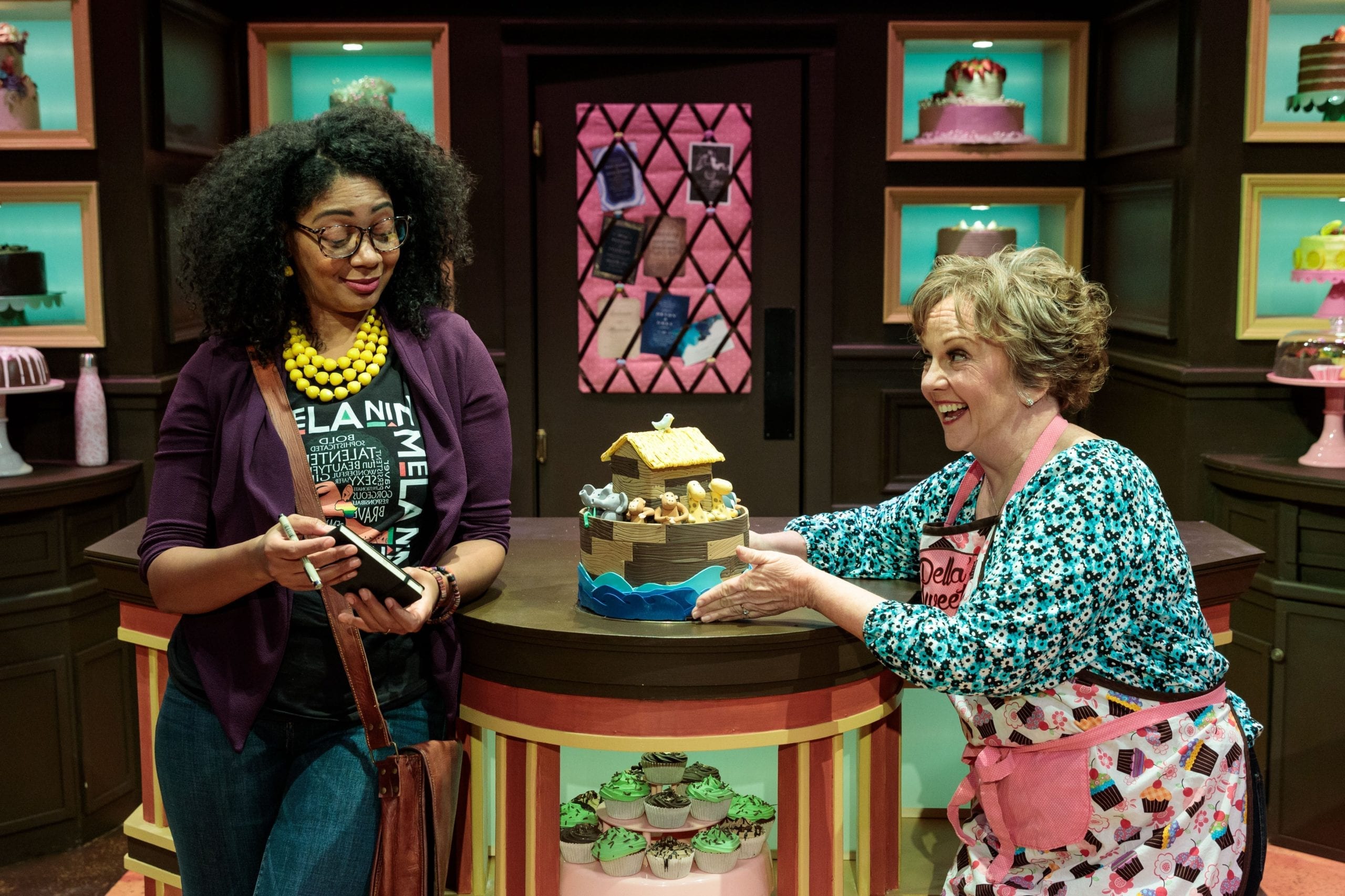SALT LAKE CITY — You’ve seen the headline: ‘Bakery sued after refusing wedding cake for same-sex couple.’ National tempers are always stoked when morality runs up against legality. Playwright Bekah Brunstetter understands that the legal ramifications of such a story may miss the deeper human drama and the emotional wreckage that inevitably surrounds planning a dream wedding. In her intimate four-character play, the brides, the baker, and the bakers husband must go toe-to-toe with one another and their own demons as they choose to stand up and do what they believe is right. With 90-minutes of tightly woven action in just two locations, Brunstetter demonstrates her understanding that the most intense human dramas can unfold within the tight confines of a human heart.

The play begins with the effusive and charming small-town baker Della (Betsy West) outlining both her baking and life philosophy of exact obedience and love for tradition. West imbues Della with all the warmth and heart a middle-aged woman is known for. Della’s smiles and laughter are irresistible, and it’s easy to imagine being swept into her welcoming hug. Enter Macy (Latoya Cameron), a cynical city woman with a sharp wit and a disdain for sugar. Where Della wants to believe that the world’s problems could be solved by sharing a slice of cake, Macy is all too ready to bring up the diabetes epidemic that threatens our nation. When at last Jen (Carianne H. Jones), Macy’s effervescent bride-to-be and Della’s late best-friend’s daughter, arrives, tensions mount quickly. Jen is hoping to secure her dream wedding cake as well as her surrogate mother’s blessing, but is slow to disclose her love for Macy, and Della is shocked at the final revelation. Immediately, the cracks start forming in each relationship. In this opening scene, Della is so likable, Macy so prickly, and Jen so doe-eyed, I found it difficult to fully invest myself in rooting for Macy and Jen, but as the play progresses each character’s background is exposed, and each works toward growth and healing.

Brunstetter (dav.d daniels/ dav.d photography).
These actors, including Joe Crnich as Della’s patriarchal but loving husband, inhabit their respective roles with full-bodied aplomb. Each actor shares moments of delightful and painful moments of human vulnerability. The plot is well structured to balance devastating arguments against moments of laugh-out-loud humor. Director Justin Ivie, in his SLAC directing debut, has made some masterful choices in bringing to life the moments when Della must wrestle with her moral conscience and less-unconscious desires. The script and actors work together seamlessly, and their efforts are highlighted by an all but flawless production team.
The Cake’s set has been beautifully designed by Shannon Robert for both fluid action and functionality, and Jaron Kent Hermansen’s lighting design brings it to life. His use of color and effects were especially delightful. The soulful soundtrack of do-wop standards is in perfect step with the flow of the action and serves to highlight rather than distract from important moments. Spencer Potter’s gorgeous costume design and the dialect coaching of Adrianne Moore help the actors fully flesh-out their characters. A special nod should also be given for the work of Flourish Bakery, a local company that hires individuals recovering from substance abuse and incarceration, for not only making the delicious looking cakes eaten on stage, but also for treating the opening-night audience to a sample of their work.

The Cake by Bekah Brunstetter (dav.d daniels/ dav.d photography).
The Cake tackles its compelling narrative and characters with joy and heart. Audiences should be advised that there are moments of graphic language, comedic nudity, and extended conversations about human sexuality throughout the play. Far from seeking to offend, the production encourages powerful conversations with loved ones around the difficult topics (shame, feminism, masculinity, class, voting, and race) that are so woven into our lives that it can feel easier to avoid talking about their devastating impacts. While the play does not show all the solutions, it succeeds in casting light on the difficult barriers that separate human hearts, even the hearts that want to love but aren’t sure how. Audience members who have examined their own relationships will likely identify with at least one of the characters as each has a moment to express their feeling of being torn in two, unable to inhabit their own skin. Like us, each character tries, fails, and tries again, clinging to love as the thing they know to be true. And yet, as I watched the production with an audience eager to applaud, I had to wonder how differently it might be perceived by audiences in other areas or less progressively minded. The script runs the risk of providing too-easy answers and hope for issues that continue to tear families apart in our own community and around the world. Nevertheless, I applaud Salt Lake Acting Company’s choice to share with us this bittersweet examination of love.
[box]The Cake plays at Salt Lake Acting Company (168 W. 500 N., Salt Lake City) on through March 10, 2019 Wednesdays-Saturdays at 7:30 PM, Sundays at 1 PM and 6 PM, and additional performances February 16 at 2 PM, February 19 at 7:30 PM, February 26 at 7:30 PM, and March 2 at 2 PM. Tickets are $33. For more information, visit SLAC’s website.[/box]
